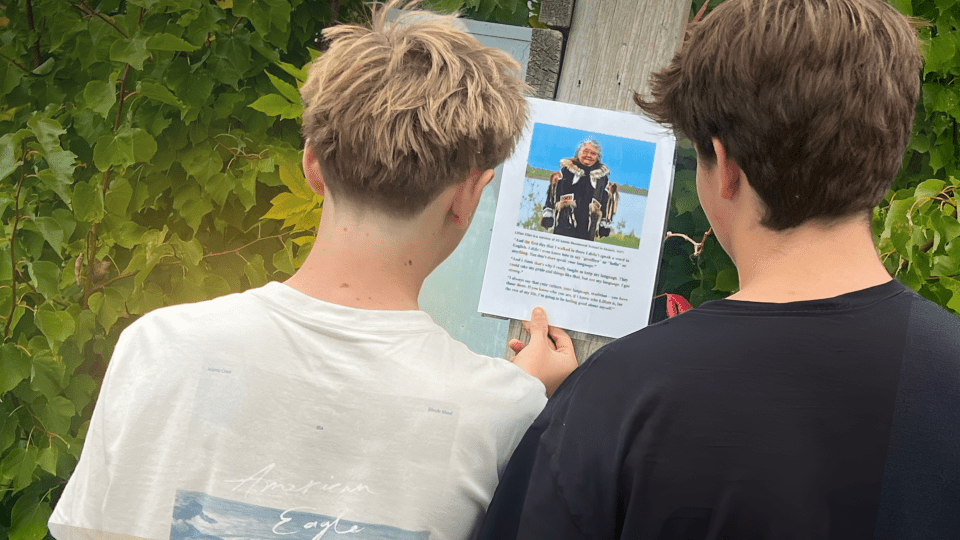
Holy Trinity High School transformed its school grounds into a path of remembrance and reflection with a Reconciliation Walk. Along the route, students and staff encountered 20 powerful stories from residential school survivors stories that invited them to pause, listen, and carry forward voices that must never be forgotten. More than an event, the Walk became a living reminder of truth, reconciliation, and the power of learning through community.
Centring Survivor Voices
The stories featured in the Walk came from a variety of sources—news articles, interviews, and videos in which survivors had already shared their experiences publicly. This was a deliberate choice by the organizing teachers, Chloe Kohlman, Michael Szombathy, and Leah Daly.
“We wanted to centre the voices of residential school survivors in a way that was authentic, respectful, and accessible for students,” Ms. Kohlman explained. “Our goal was to highlight a variety of perspectives, showing the wide-ranging impacts of residential schools while amplifying voices that might not always be heard in the classroom.”
By grounding the Walk in survivor testimonies, the project honoured truth-telling while also giving students a chance to encounter lived experiences in a deeply personal way.
A Space for Reflection
The design of the Walk intentionally slowed students down, creating space for them to process what they were reading. For Ms. Kohlman, this was one of the project’s most powerful aspects.
“Reading the posters outside, surrounded by the quiet and space to reflect, allowed the stories to settle in a meaningful way,” she said. “I noticed many of my students remarking on how much more impactful the experience was compared to simply learning in class. Some shared that even if they already knew the information, seeing it presented this way gave them a much deeper emotional connection.”
Her hope was that participants would walk away with more than knowledge. “While many already know the facts, walking the route, reading survivors’ stories, and taking time to absorb their voices creates a more personal and emotional connection. My hope is that participants walk away not only with greater knowledge, but with empathy and a stronger sense of responsibility to take part in reconciliation.”
ReconciliACTION in Practice
The Reconciliation Walk is part of Holy Trinity’s broader commitment to ReconciliACTION—ensuring reconciliation is lived out not only in words but in meaningful, ongoing action.
“At Holy Trinity, we are committed to ReconciliACTION, which means supporting truth and reconciliation not just in words, but through ongoing action,” said Ms. Kohlman. The Walk complements other initiatives, including the Indigenous Student Association, which has been active for three years, and the incorporation of Algonquin language into the life of the school spearheaded by Chaplain Leah Daly. “For example, we now use the Algonquin word pijashig (meaning ‘welcome’) as part of our community identity. Together, these actions help ensure that reconciliation is not a one-time event, but an important part of our school culture.”
Building a Lasting Commitment
When asked about the future of the project, Ms. Kohlman emphasized that this Walk is just the beginning. “Our hope is to continue building relationships with Indigenous communities and to expand on the Walk each year, offering new stories, perspectives, and opportunities for reflection. We see this as part of a long-term commitment to truth and reconciliation, not a single event. Each year, we want to deepen our knowledge and strengthen our actions as a school community.”
An Invitation to Our Community
The Reconciliation Walk at Holy Trinity shows what can happen when a school community takes time to listen, reflect, and act. But reconciliation is not limited to classrooms or school grounds—it is a responsibility we all share. Families and community members can take steps, too: reading survivors’ testimonies, learning about the history and legacy of residential schools, and supporting Indigenous voices and leaders. Together, every act of listening, every conversation, and every choice to engage with truth helps to move us closer to a future rooted in justice, empathy, and healing.